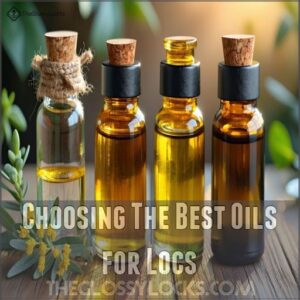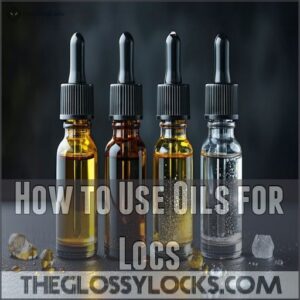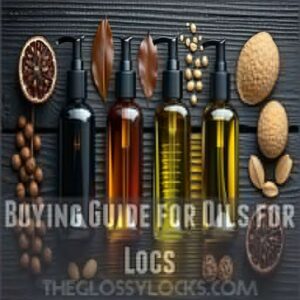This site is supported by our readers. We may earn a commission, at no cost to you, if you purchase through links.
 Looking for the best oil for dreads? You’re in luck!
Looking for the best oil for dreads? You’re in luck!
Your locs crave targeted nourishment, and oils like pumpkin seed, grapeseed, tea tree, and black seed can be your hair’s secret weapon.
These powerhouse oils tackle everything from hair growth to scalp health, giving your locs the TLC they deserve.
Whether you’re battling dryness, seeking shine, or wanting to reduce breakage, there’s an oil that’s got your back. The key is matching the right oil to your hair’s unique texture and needs.
Pro tip: mix essential oils with carrier oils and massage gently into your scalp for maximum absorption. Your dreads are about to level up.
Table Of Contents
- Key Takeaways
- Top 4 Best Oils for Dreadlocks
- Choosing The Best Oils for Locs
- Benefits of Oils for Locs
- How to Use Oils for Locs
- Buying Guide for Oils for Locs
- Frequently Asked Questions (FAQs)
- What oil makes your dreads grow?
- What is the best oil to thicken dreads?
- Should I oil my locs everyday?
- How should I oil my locs?
- Does castor oil help dreads?
- How Often Should Oils Be Applied to Dreads?
- What is the Best Way to Apply Oils to Dreads?
- What Are the Best Oils for Scalp Health?
- Are There Any Oils That Should Be Avoided for Dreads?
- Are There Any Oils That Can Help With Itchy Scalp?
- Conclusion
Key Takeaways
- Use oils like pumpkin seed, grapeseed, tea tree, and black seed to promote growth, lock in moisture, soothe your scalp, and strengthen your locs.
- Blend essential oils with carrier oils for scalp and hair health, using options like tea tree with jojoba for hydration or peppermint for itch relief.
- Avoid daily oiling to prevent buildup; stick to every 1-2 weeks, focusing on your hair’s moisture needs and scalp condition.
- Apply oils by warming them, massaging from roots to tips, covering with a cap for absorption, and rinsing thoroughly to maintain healthy, clean locs.
Top 4 Best Oils for Dreadlocks
If you’re on a journey to maintain healthy, vibrant dreadlocks, choosing the right oils can make all the difference in your hair care routine.
We’ve curated the top four nourishing oils that’ll help you achieve luscious, well-moisturized locs, ensuring your hair looks and feels its absolute best.
1. Pumpkin Seed Oil for Hair Growth
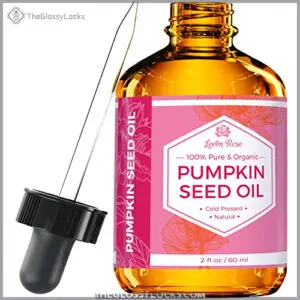
The magic of hair growth can be found in a humble bottle of pumpkin seed oil, a natural elixir that’s changing the loc game. You’re looking at a powerhouse nutrient that packs a serious punch for hair health. This cold-pressed oil is loaded with vitamins A and E, zinc, and fatty acids that’ll make your locs stand up and take notice.
Research shows some serious potential: men using pumpkin seed oil supplements saw a whopping 30% increase in hair growth compared to placebo groups.
Apply it directly to your scalp with a gentle massage, letting the oil work its magic for 30 minutes before washing out with a pH-balancing shampoo. For the supplement route, consider 1000 mg capsules taken three times daily after meals – but chat with your doc first, since supplement quality isn’t always regulated.
Hot oil treatments are another game-changer. Warm the oil gently, work it through your locs, and let it sit for 20-30 minutes before washing. Pro tip: patience is key. You won’t see overnight miracles – results typically take several weeks of consistent use.
While scientific research is still catching up, anecdotal evidence suggests pumpkin seed oil could be your secret weapon for healthier, stronger locs. It’s not just an oil; it’s a growth-boosting, inflammation-fighting, nutrient-rich ally in your loc journey.
Best For: Those seeking natural hair growth solutions and improved hair and scalp health.
- Boosts hair growth and reduces shedding.
- Strengthens hair and reduces dandruff.
- Hydrates and improves scalp health.
- Results may vary; not guaranteed to work for everyone.
- Requires consistent use for noticeable results.
- May need to be combined with other hair care products for optimal results.
2. Cold Pressed Grapeseed Oil 32oz
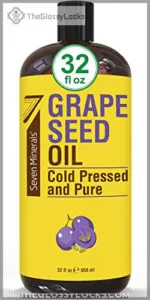
Seven Minerals’ Cold Pressed Grapeseed Oil emerges as a game-changer for loc lovers looking to transform their hair care routine. This liquid gold packs a punch with its lightweight, non-greasy formula that’s perfect for all hair types. Loaded with antioxidant superstars like vitamins C and E, it’s your secret weapon against hair damage and scalp stress. What’s more, its benefits also extend to grapeseed oil benefits, making it a must-have for any hair care enthusiast.
Want to level up your loc game? This oil’s got your secret. Its essential fatty acids work magic on your hair’s texture, fighting frizz and adding killer shine. Thin or fine-haired folks, rejoice! Unlike heavy oils that weigh you down, grapeseed oil slides in smoothly, giving your locs the TLC they crave.
Application’s a breeze. Just massage a few teaspoons into damp locs before washing, or use it as a pre-shampoo treatment. Leave it for 30 minutes and watch the transformation. Bonus: it’s non-comedogenic, making it a win for all skin types. From moisturizing to protecting, this 32oz bottle is your all-in-one hair and skin hero.
Best For: Individuals seeking a versatile, lightweight, and non-greasy oil for hair and skin moisturizing, scalp care, and cooking.
- Lightweight and non-greasy texture, suitable for all hair types.
- Multi-purpose uses: hair care, skin moisturizing, and cooking.
- Large 32oz bottle offers excellent value and longevity.
- May not be suitable for those with strong scent preferences (although described as mild).
- The large bottle size may be less convenient for travel.
- No specific information on sourcing or sustainability practices.
3. Organic Tea Tree Oil by Eve Hansen
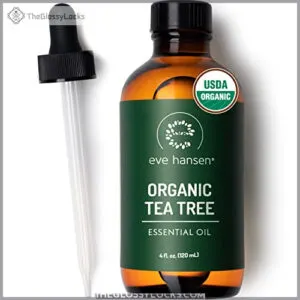
Amplify your loc game with Eve Hansen’s Organic Tea Tree Oil, a powerhouse for scalp health and hair growth.
This oil is also available for purchase on Eve Hansen Tea Tree Oil, making it easy to incorporate into your dreadlock care routine.
Best For: Individuals seeking a high-quality, pure tea tree oil for various uses, including skincare, haircare, and aromatherapy.
- High purity and potency, verified by GC/MS testing.
- Versatile applications for skin and hair concerns.
- Natural, organic, vegan, and cruelty-free formulation.
- Strong scent that may not appeal to all users.
- Dropper may not provide precise dispensing.
- Requires dilution before topical application.
4. Organic Black Seed Oil Premium Grade
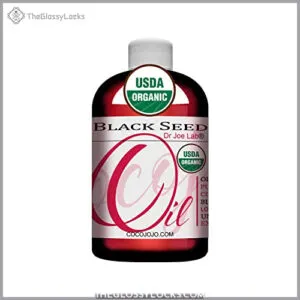
Packed with potential, Organic Black Seed Oil is your dreadlocks’ secret weapon for supreme nourishment.
Sourced from Saudi Arabian seeds and cold-pressed to perfection, this premium organic oil delivers a powerhouse of antioxidants and vitamins directly to your scalp and locs.
You’ll love how it transforms dry, brittle strands into soft, moisturized locks that shine with health.
At around $26 for an 8-oz bottle, it’s an investment in your hair’s future – think of it as a spa treatment for your dreads.
Pro tip: Store this liquid gold in the refrigerator to preserve its potency and extend its two-year shelf life.
Whether you’re battling scalp dryness or seeking that perfect loc moisture, this oil’s got your back, bringing natural goodness straight from nature’s pharmacy.
Best For: Individuals seeking a natural, organic oil to moisturize and nourish their hair, particularly those with dry, brittle, or damaged dreadlocks.
- Rich in antioxidants and vitamins for hair health.
- Moisturizes and softens dry, brittle hair.
- Helps maintain healthy-looking dreadlocks.
- Strong scent may be off-putting to some.
- Absorption and greasy residue vary by user experience.
- Not explicitly labeled as food-grade.
Choosing The Best Oils for Locs
When you’re choosing oils for your locs, it’s vital you take your unique hair type, scalp condition, and personal hair goals into account.
Your perfect oil blend will depend on factors like moisture needs, potential allergies, and the specific nourishment your locs crave.
Hair Type
At the heart of dreadlock care, your unique hair type is the compass guiding oil selection. Your locs deserve a personalized approach that celebrates their individual character and needs.
- Hair density determines your oil’s weight: fine hair craves lightweight oils that won’t drag down your crown, while thick locs hunger for richer, more intense moisture.
- Scalp sensitivity whispers its preferences: gentle, chemical-free oils like lavender and tea tree can soothe and protect, turning potential irritation into a healing embrace.
- Styling frequency influences your oil choice: quick-absorbing, residue-free oils become your styling ally, ensuring your locs remain flexible and ready for any creative expression.
Remember, understanding your hair’s unique texture, porosity, and health is the first step to revealing your locs’ true potential.
Scalp Condition
Your loc journey starts with understanding your scalp’s unique needs.
Different scalp conditions demand targeted oil solutions.
Check out this quick guide to match your scalp’s health with the perfect oil treatment:
| Scalp Issue | Recommended Oil | Benefits |
|---|---|---|
| Dandruff | Tea Tree | Antifungal |
| Dryness | Jojoba | Moisturizing |
| Irritation | Peppermint | Soothing |
| Inflammation | Eucalyptus | Cooling |
| Buildup | Rosemary | Clarifying |
Hair Goals
Releasing your loc’s potential starts with decoding your unique hair goals. Every strand tells a story of personal transformation and style.
- Discover your hair’s genetic blueprint
- Decode your loc’s moisture-absorption rhythm
- Match oil weight to your loc’s distinctive texture
Navigate this journey with precision, turning your locs into a powerful expression of individuality. This process helps unlock your loc’s potential and achieve your hair goals.
Scent Preferences and Allergies
The fragrance of your dreadlock hair oil can make or break your styling experience. Scent sensitivity isn’t just a personal preference—it’s a vital factor in choosing the right dread hair treatment. When exploring blends of essential oils for dreadlocks, you’ll want to tread carefully, balancing your love for aromatic treatments with potential allergy risks. Natural and organic options, such as those with best oils for dreads, can provide all the nourishment while minimizing irritation.
Before diving into any new dreadlock hair oil, always perform a patch test. This simple step can save you from potential scalp irritation and uncomfortable reactions. Dab a small amount of the oil blend on your inner forearm and wait 24 hours. No redness, itching, or swelling? You’re good to go.
Fragrance-free options are a godsend for those with sensitive skin. Unscented carrier oils like jojoba or grapeseed can provide all the nourishment without the sensory overload. If you’re drawn to essential oils, proceed with caution. Lavender oil for dreadlocs might smell divine, but it can trigger allergic reactions in some people.
Essential oils pack a powerful punch—both in fragrance and potential benefits. Tea tree, rosemary, and cedarwood can work wonders for your scalp, but they’re not one-size-fits-all solutions. Some folks discover these intense aromas overwhelming, while others can’t get enough. The key is finding your perfect balance.
When mixing your essential oil blend for dreadlocks, dilution is your best friend. Always mix a few drops of essential oil with a carrier oil to prevent skin irritation. Think of it like adding hot sauce to your favorite dish—a little goes a long way.
Your scalp’s health trumps everything. Pay attention to how your locs and skin react to different oils. Some people discover unexpected sensitivities, while others find their holy grail of dreadlock hair treatment through careful exploration. Remember, what works for one person mightn’t work for another—and that’s perfectly okay.
Benefits of Oils for Locs
You’ll discover the secret to vibrant, healthy locs by understanding the transformative power of specialized hair oils.
These nutrient-rich elixirs aren’t just products, but powerful allies.
They’ll nourish your scalp, strengthen your dreadlocks, and help you achieve the radiant, well-maintained style you’ve been dreaming of.
Moisturizing and Nourishing
Nurturing your locs demands a strategic approach to moisturizing and nourishing.
Your dread care can transform with these hydration tips:
- Deep conditioning prevents brittle, lifeless strands
- DIY oil recipes boost moisture retention
- Consistent application brings out your locs’ natural radiance
Mastering oil benefits means understanding your hair’s thirst for nourishment and creating a personalized care ritual.
Strengthening and Reducing Breakage
Want to stop loc breakage in its tracks? Jojoba oil might just be your hair’s new best friend. While moisture keeps your locs looking lush, strength prevents them from falling apart – and that’s where this liquid gold comes in. To learn more about the benefits of using oils for your locs, check out our guide on dreadlock oil benefits.
| Oil Property | Benefits | Application Tips |
|---|---|---|
| Vitamin Rich | Supports follicle health | 2x weekly massage |
| Elastic Boost | Reduces breakage | Warm before applying |
| Antimicrobial | Protects scalp | Mix with carrier oil |
| Circulation Aid | Stimulates growth | Gentle scalp massage |
| Moisture Seal | Prevents split ends | Leave on 30 minutes |
Jojoba oil isn’t just another hair product – it’s a powerhouse packed with vitamins B and E, zinc, copper, and selenium. These nutrients work overtime to strengthen your locs from root to tip, creating a shield against dreaded breakage.
Preventing hair breakage isn’t about miracle solutions, but smart maintenance. By improving blood circulation and hair elasticity, jojoba oil helps your locs stay flexible and resilient. It’s like giving your hair a workout and a protein shake simultaneously.
Pro tip: Mix jojoba with coconut or olive oil for a custom loc-strengthening cocktail. Start with small amounts and adjust based on your hair’s unique personality. Some locs drink up oil like a camel at an oasis, while others prefer a more minimal approach.
Your loc maintenance routine should be as unique as you are. Experiment with oiling frequency – some folks need weekly treatments, others can go 10-14 days between applications. Listen to your hair, watch how it responds, and adjust accordingly.
Remember, strong locs aren’t born – they’re carefully cultivated. With jojoba oil in your arsenal, you’re well on your way to loc liberation.
Soothing Scalp and Reducing Inflammation
Your locs can be more than just a hairstyle—they’re a canvas for scalp wellness.
Building on your hair’s strength, let’s tackle those pesky scalp issues that drive you crazy.
Anti-inflammatory oils are your secret weapon against scalp irritation and dryness.
Tea tree and eucalyptus oils work magic, targeting inflammation like a precision strike. They’ll calm that itchy scalp, kick dandruff to the curb, and create a healthy environment for your locs to thrive.
Think of these oils as your scalp’s personal wellness team, soothing and protecting with every drop.
Promoting Growth and Thickness
Discover the secret to luscious, thick dreads.
Essential oil blends are your growth elixir, acting like a power-packed nutrition plan for your hair.
Basil growth oil emerges as a game-changer, stimulating follicles and preventing hair loss.
Regularly incorporating best oils for dreads into your hair care routine can transform your loc journey, offering a natural pathway to resilient locks that tell your unique hair story. DIY growth oil blends can transform your loc journey, offering a natural pathway to robust, resilient locks that tell your unique hair story.
Adding Shine and Luster
Building on your loc growth journey, let’s discover the shine techniques that’ll make your dreads sparkle. Oils aren’t just about health—they’re your secret weapon for that head-turning luster.
- Nourish from root to tip
- Seal in moisture like a pro
- Reflect light with natural brilliance
- Combat dryness and dullness
- Create a glossy, healthy appearance
Your locs deserve to shine, and these oil blends are your ticket to radiant, head-turning dreads.
How to Use Oils for Locs
For maintaining healthy, vibrant dreadlocks, using oils can be a game-changer.
You’ll want to master the art of selecting, mixing, and applying oils to transform your loc care routine and achieve that enviable, lustrous look.
Mixing Essential Oils With Carrier Oils
Alchemy transforms your dreadlock care with strategic essential and carrier oil blending. Master the art of creating luscious locs by mastering dilution ratios and safety techniques.
Choosing the right oil for your locs is vital to replenishing moisture and preventing dryness, breakage, and frizz, with natural oils for dreadlocks being an excellent option.
| Carrier Oil | Essential Oil | Purpose |
|---|---|---|
| Coconut | Tea Tree | Dandruff Control |
| Jojoba | Rosemary | Hair Growth |
| Argan | Lavender | Scalp Soothing |
Patch testing is vital. Mix 2-5 drops of essential oil per ounce of carrier oil. Store your custom blend in a dark glass bottle, away from direct sunlight, to preserve its potency and magic.
Applying to Scalp and Locs
Throughout your loc journey, mastering the art of oil application can transform your hair’s health and appearance. Getting the right oil on your dreads isn’t just a routine—it’s a ritual of self-care and hair empowerment.
- Know your scalp’s unique landscape
- Customize your oil application technique
- Understand your locs’ moisture needs
- Embrace gentle, intentional massage
Start by parting your locs carefully to expose your scalp, allowing direct access to the roots. Using your fingertips, gently massage the carefully blended oil mixture directly onto the scalp, working from the roots outward. The key is using light, circular motions that stimulate blood circulation without causing unnecessary tension.
Once you’ve nourished the scalp, gradually work the remaining oil through the entire length of your locs. Focus on distributing the oil evenly, paying extra attention to dry or brittle sections. This methodical approach facilitates maximum absorption and helps prevent frizz while keeping your locks looking vibrant and healthy.
Leaving on for at Least 30 Minutes
After massaging your chosen dreadlock oil into your scalp, let it work its magic for at least 30 minutes.
Think of this time as a spa treatment for your locs—the longer they soak, the better the results.
For folks with sensitive scalps, consider an overnight treatment that’ll give your dreads deep conditioning. Mature locs might need extra time to fully absorb those nourishing nutrients.
Pro tip: Cover your hair with a soft cap to maximize absorption rates and protect your pillowcase.
Rinsing and Washing Thoroughly
Purification is the final act in your loc oil ritual, transforming your hair from greasy to glorious.
To maintain healthy locs, consider using best oils for dreads.
Your post-oil wash deserves strategic precision:
- Select a clarifying shampoo that dissolves oil
- Use lukewarm water to prevent scalp irritation
- Rinse thoroughly, ensuring zero product buildup
- Choose a lightweight conditioner that won’t weigh down locs
- Gently squeeze—don’t rub—to maintain loc integrity
Embrace this cleansing dance, and watch your dreads shine with renewed radiance.
Buying Guide for Oils for Locs
When shopping for oils to nourish your locs, you’ll want to take several key factors into account that’ll make or break your hair care routine.
Your perfect oil isn’t just about moisture, but finding a product that matches your unique hair type, scalp condition, and specific hair goals.
Oil Consistency and Absorption Rate
Anyone diving into loc maintenance knows that oil consistency can make or break your hair game.
Your dreadlocks’ health hinges on finding an oil that smoothly penetrates without leaving a greasy residue.
Different hair types demand unique absorption speeds – what works for thick locs might weigh down thinner strands.
When hunting for the best oil for dreads, pay attention to how quickly it absorbs and whether it matches your specific hair texture, considering factors like loc oil absorption rates.
Product reviews can offer valuable insights into long-term effects and performance.
Vitamin, Mineral, and Fatty Acid Content
Not all oils are created equal when nurturing your locs.
Think of your hair as a garden needing specific nutrients – vitamins, minerals, and fatty acids are your secret weapons.
Coconut oil delivers protein protection, while hemp seed oil brings balanced omega goodness. Argan oil packs vitamin A punch, and jojoba mimics your scalp’s natural oils.
Avocados are also rich in moisturizing oils, which can nourish and strengthen your locs.
These powerhouse ingredients strengthen, moisturize, and defend your dreads from root to tip, giving you that healthy, vibrant loc life you’re after.
Scent
After analyzing the vitamin and mineral content of your dread hair treatment oils, you’ll want to explore another sensory dimension: scent. Your dreadlock oil’s fragrance can transform your hair care routine from mundane to magical.
| Scent Preferences | Allergy Concerns |
|---|---|
| Floral | Nut Allergies |
| Citrus | Essential Oil Sensitivities |
| Woody | Perfume Reactions |
| Herbal | Fragrance Irritants |
| Spice | Parfum Allergies |
Think of scent intensity like a personal signature – it’s uniquely yours. Some folks love a bold, lingering fragrance that announces their presence, while others prefer subtle, whisper-soft notes that hint at sophistication. With dreadlock oils, you’ve got a spectrum of fragrance notes to explore.
Jojoba oil brings a light, almost undetectable aroma that won’t overpower your senses. Argan oil offers a nutty, warm scent that feels grounding. Tea tree oil delivers a crisp, invigorating punch that can feel like a morning espresso for your scalp.
Pro tip: Always perform a patch test with new oils. Some essential oils for locs can trigger allergic reactions, so check the ingredient list carefully. Your best oil for locs shouldn’t just nourish your hair but also make you feel confident and comfortable.
Remember, the right scent can turn your loc oil treatment from a routine task into a sensory experience you’ll look forward to.
Packaging and Ease of Application
Scent might catch your eye, but packaging can make or break your dreadlock oil experience.
Look for smart bottle designs with pump dispensers and spill-proof caps that make application a breeze. Roll-on applicators and dropper tips help you target those locs precisely without waste. Travel-sized options keep your best dreadlock oil handy wherever you go.
When hunting for the perfect locs oil treatment, prioritize packaging that’s user-friendly, preserves oil quality, and makes reapplication a cinch.
Considering the different best oils for dreads, your hair – and your patience – will thank you.
Frequently Asked Questions (FAQs)
What oil makes your dreads grow?
Want luscious dreads that turn heads?
Castor oil’s your secret weapon!
It’ll turbocharge your hair growth, strengthening follicles and boosting thickness.
Massage it into your scalp regularly, and watch those locks flourish like a boss.
What is the best oil to thicken dreads?
Castor oil’s your secret weapon for thicker dreads!
It’ll boost hair growth, strengthen follicles, and add serious volume.
Massage it into your scalp regularly, and you’ll see those locs getting fuller and more fabulous.
Should I oil my locs everyday?
You shouldn’t oil your locs daily.
Overdoing it can lead to buildup and greasy residue.
Instead, aim to oil your locs every 1-2 weeks, depending on your hair’s moisture needs and personal scalp condition.
How should I oil my locs?
Just like a gardener nurtures plants with care, your locs thrive on gentle, strategic oiling.
Warm the oil.
Massage from roots to tips, cover with a cap, and let it soak for 30 minutes to deeply nourish your locs.
Does castor oil help dreads?
Castor oil strengthens dreads, promotes growth, and locks in moisture.
Its thick consistency helps nourish your scalp while reducing breakage.
Use it sparingly to avoid buildup, and pair it with a lighter oil for balance.
How Often Should Oils Be Applied to Dreads?
Apply oils to your dreads every 1-2 weeks, depending on how dry your hair and scalp feel.
Over-oiling can lead to buildup, so focus on lightweight oils and adjust based on your hair’s needs.
What is the Best Way to Apply Oils to Dreads?
Ever wondered how to keep your dreads thriving?
Warm the oil slightly, massage it into your scalp, and work it down the locs.
Cover with a shower cap for deeper absorption, then rinse thoroughly.
What Are the Best Oils for Scalp Health?
Keep your scalp happy with tea tree oil for its antifungal punch.
rosemary oil to boost circulation.
jojoba oil for lightweight hydration.
Blend these with a carrier oil for a healthy, balanced scalp.
Are There Any Oils That Should Be Avoided for Dreads?
Overusing coconut oil, surprisingly linked to buildup issues in 1 out of 3 dreadlock users, can weigh your locs down.
Avoid heavy mineral oils and petroleum-based products too—they clog pores, attract dirt, and stunt growth.
Are There Any Oils That Can Help With Itchy Scalp?
Tea tree oil’s antifungal properties can soothe itchy scalps.
peppermint oil provides a cooling relief.
Blend with jojoba oil for balance and massage it in—it’s like a spa day for your head.
Conclusion
Did you know healthy hair grows about half an inch per month?
The best oils for dreads can help you maximize that growth while keeping your locs strong and hydrated.
Pumpkin seed oil boosts growth, grapeseed oil locks in moisture, tea tree oil soothes your scalp, and black seed oil strengthens from root to tip.
By using oils suited to your needs, you’ll keep your locs looking healthy while preventing dryness, breakage, or itchiness.

